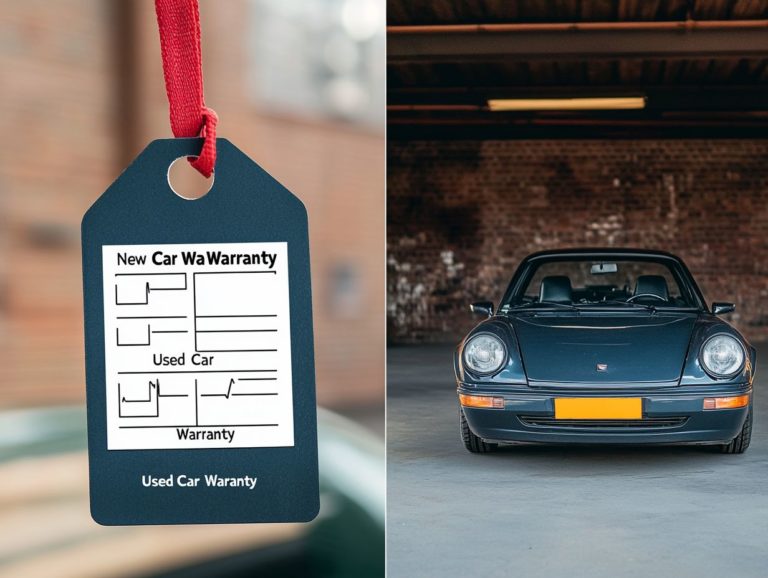5 Essential Warranty Questions for Lease Cars
When leasing a car, understanding the details of the warranty can greatly impact your overall experience.
Consider these five essential questions:
- What exactly is covered under the warranty?
- What is its duration?
- What terms and conditions apply?
It s also crucial to find out whether the warranty is transferable and how any modifications you make might affect it.
You should also explore the benefits of leasing, the different types of warranties available, and the claims process involved.
Get ready to hit the road with total confidence!
Contents
- Key Takeaways:
- 1. What Is Covered Under the Warranty?
- 2. How Long Does the Warranty Last?
- 3. What Are the Terms and Conditions of the Warranty?
- 4. Is the Warranty Transferable?
- 5. What Happens If I Make Modifications to the Car?
- What Is a Lease Car and How Does It Work?
- Frequently Asked Questions
- What is the difference between manufacturer and extended warranty for lease cars?
- Do I really need a warranty for my lease car?
- What does a typical warranty for a lease car cover?
- Can I transfer my warranty to a new lease car?
- What happens if I exceed the warranty’s mileage or time limit?
- Is it possible to cancel a warranty for a lease car?
- In Summary
Key Takeaways:

- Understand what is covered and what is not under the warranty for a lease car.
- Clarify the length of the warranty before signing a lease agreement.
- Be aware of the warranty’s terms and conditions, including limitations.
1. What Is Covered Under the Warranty?
Understanding what’s included in your warranty is essential when leasing a car. This is especially true if you’re working with reputable companies like Signature Auto Group in NYC and Brooklyn. It’s also wise to consider the top questions to ask before buying a used car to ensure you make an informed decision.
Different vehicle models come with specific warranty agreements that detail coverage for car problems, help when your car breaks down on the road, and any additional fees that might arise during your lease term. Before purchasing, consider asking your salesperson the 5 key questions to ensure you understand all aspects of your deal.
These warranties generally fall into two categories: manufacturer’s warranties, which cover the basics provided by the vehicle’s maker, and extended warranty options that you can purchase for longer protection. As you enter a leasing agreement, it’s crucial to consider 5 key takeaways about car warranties and how they align with the lease terms. They can significantly affect your financial responsibilities.
Having the right insurance coverage is also critical. It protects you from unexpected repair costs and provides peace of mind throughout your leasing experience.
This thoughtful combination of warranties and insurance can help you navigate potential expenses, offering essential support if any issues arise.
2. How Long Does the Warranty Last?
The duration of a warranty can vary greatly depending on the leasing company, vehicle model, and specific lease term.
Many warranties are designed to last for the length of your lease or a set number of miles driven.
For example, companies like Signature Auto Group offer different options that can greatly influence your decision-making process. Factors such as mileage allowances are important; opting for a higher mileage limit might come with a shorter warranty period.
Some leasing companies even provide extended coverage, giving you peace of mind that lasts beyond the initial warranty. This can be particularly beneficial if you plan to drive extensively or expect to keep the vehicle longer than anticipated. Before making a decision, consider these 5 questions to ask about car financing options.
Ultimately, knowing these details allows you to make informed choices that suit your driving habits and lifestyle needs.
3. What Are the Terms and Conditions of the Warranty?
The terms and conditions of a warranty outline the coverage you receive. They detail everything from limits on warranty coverage to required maintenance, and any penalties for termination that could affect your lease return process.
It s essential to understand these specific terms, as many agreements include limitations that can restrict liability for certain types of damage or wear especially if these issues arise from neglect or improper use.
You may find yourself obligated to conduct routine inspections or servicing at designated intervals to keep the leased item in peak condition. Neglecting these maintenance requirements could lead to reduced coverage at lease-end, resulting in unexpected charges or complications when you return the asset.
Thus, having a firm grasp of these details can greatly enhance your leasing experience, ensuring a seamless transition when it s time to return the item.
Be sure to review your leasing agreements closely or contact agencies for more information.
4. Is the Warranty Transferable?

Understanding whether a warranty is transferable is essential when considering a lease return. Some leasing agreements, like those from Signature Auto Group in NYC, allow the warranty to accompany the vehicle to its next owner.
This distinction impacts the overall value of your lease. A transferable warranty enhances the appeal of your vehicle during lease return and makes it more attractive to potential buyers or lessees in the secondary market.
Such warranties provide peace of mind regarding repairs. This boosts the vehicle’s residual value (the car’s worth at the end of the lease) and can lead to higher prices in leasing scenarios.
Vehicles with transferable warranties can put you in a favorable negotiating position. This ensures a smoother lease transition.
5. What Happens If I Make Modifications to the Car?
Modifying a leased car can void your warranty coverage. You may face penalties for termination if those changes impact the vehicle’s performance or safety.
Customizing your vehicle might introduce risks that complicate your leasing experience. Popular modifications, like installing a new audio system or adjusting the suspension, can alter the car’s original specifications.
These changes jeopardize warranty claims and may result in additional charges at the end of your lease. For example, if you change the vehicle’s height, you could face fees for restoring it to its original state.
Understanding the leasing rules before making alterations is crucial. This helps avoid unexpected costs.
What Is a Lease Car and How Does It Work?
A lease car is a vehicle acquired through a leasing agreement, which is a contract for using a car for a set period. You cover upfront costs and monthly payments over the lease duration.
This arrangement offers access to a car without hefty total costs associated with ownership. It’s particularly beneficial in urban areas like NYC, where Signature Auto Group offers flexible lease terms across various vehicle models.
Leasing typically attracts those who appreciate new technology and features but want to avoid long-term commitments. Selecting a vehicle that matches your personal needs and budget is crucial.
Be sure to consider total lease costs, including down payments and potential fees. Most standard leases last between two to four years, which impacts your overall expenses and flexibility.
What Are the Benefits of Leasing a Car?
Leasing a car presents a wealth of advantages, including lower upfront costs, the opportunity to frequently drive the latest vehicle models, and flexible lease terms designed to suit various budgets and lifestyles. This makes leasing an appealing choice for many drivers.
When you lease, you can enjoy significant cost savings; monthly payments are often lower than if you were to purchase a vehicle outright. This financial flexibility allows you to allocate funds to other essential expenses, giving you more room in your budget.
Insurance coverage is generally more manageable as well. Leased vehicles typically come with lower insurance rates, thanks to their newer status, which can further ease your financial burden.
Companies like Signature Auto Group shine in providing customized leasing specials that cater to your individual preferences. This ensures you can find the ideal vehicle that aligns perfectly with your needs and financial situation.
With personalized options and expert guidance, navigating the leasing process becomes a breeze, significantly enhancing your overall experience as a driver.
What Are the Different Types of Warranties for Lease Cars?

When leasing cars, you will encounter various warranty options that provide different levels of protection against car problems. To navigate these options effectively, it’s important to know the top 10 questions about car warranties, as they can significantly impact your leasing experience.
Comprehensive coverage protects against a wide range of issues, often including roadside assistance. This ensures you’re covered no matter what happens. Bumper-to-bumper warranties offer extensive protection, usually covering nearly all parts except wear-and-tear items. In contrast, powertrain warranties focus on key components like the engine and transmission, ensuring you have peace of mind regarding vehicle performance.
By understanding these choices, you can enhance your driving experience and effectively protect your financial investment.
How Can a Person Determine If They Need an Extended Warranty?
Deciding whether you need an extended warranty depends on various factors, including the type of vehicle, duration of your lease, and your specific driving habits outlined in your leasing agreement.
Consider the vehicle’s reliability ratings and how often you plan to use it. If your vehicle is known for its durability, you might not need as much coverage as one known for mechanical issues.
Also, think about your personal driving patterns. Are you a daily commuter or someone who enjoys a long road trip? This can significantly influence your decision. Weigh the cost of the warranty against potential repair expenses to assess the overall value and practicality of the investment.
What Are the Common Issues Covered by Warranties for Lease Cars?
Warranties for lease cars typically cover common issues such as:
- Mechanical failures
- Electrical system malfunctions
- Defects that may arise during your lease
- Tire wear
- Brake system failures
- Battery issues
This coverage, combined with adequate insurance, gives you peace of mind throughout your leasing journey. Understanding how warranties interact with your insurance can save you from potential headaches.
While warranties cover vital repairs, your insurance typically handles incidents like accidents and theft. Therefore, it’s essential to understand both warranty terms and insurance parameters, as well as the key factors to consider when leasing a car, to avoid unexpected costs and ensure a seamless leasing experience.
What Are the Steps to Take When Filing a Warranty Claim for a Lease Car?
Filing a warranty claim for your lease car involves several steps:
- Review your warranty coverage.
- Gather necessary documentation.
- Contact your leasing company, such as Signature Auto Group, to start the claim process.
First, understand the specifics of your warranty, as this defines the repairs and services covered. Once clear, collect relevant documents like your lease agreement, service records, and any previous correspondence with the leasing company.
Clear communication is essential. Reach out to the leasing company promptly to inform them of the issue and provide your gathered documentation. This will speed up the claims process and help ensure that nothing important is overlooked.
Being polite and well-organized can significantly enhance your claims experience, making it easier to get the help you need.
Frequently Asked Questions

What is the difference between manufacturer and extended warranty for lease cars?
A manufacturer warranty covers the vehicle for a specific time or mileage. An extended warranty offers extra protection beyond that initial period.
For lease cars, consider the lease length when choosing a warranty.
Do I really need a warranty for my lease car?
Having a warranty isn’t required, but it can give you peace of mind. It protects you from unexpected repair costs.
Evaluate your driving habits and lease duration to decide.
What does a typical warranty for a lease car cover?
A basic warranty covers repairs for issues caused by the manufacturer. It might also include roadside assistance and other benefits, depending on the plan.
Can I transfer my warranty to a new lease car?
Yes, most warranties are transferable to a new vehicle. Check with your warranty provider to ensure the new car meets their requirements.
Be aware of any additional fees that may apply.
What happens if I exceed the warranty’s mileage or time limit?
Exceeding the warranty limits means you may cover repair costs yourself. Carefully review your lease terms and warranty length to avoid surprises.
Is it possible to cancel a warranty for a lease car?
Cancellations depend on the warranty’s specific terms. Some allow it, while others don t. Review the terms and consult your warranty provider if you have questions.
In Summary
Understanding warranties for lease cars is crucial. A warranty can save you from unexpected costs and enhance your peace of mind. Before making a decision, consider these 5 questions to consider before leasing a car to protect your investment!






